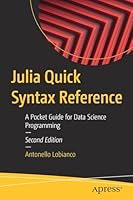
Programming for Data Science: 4 Books in 1. The Complete Beginners Guide you Can’t Miss to Master the Era of the Data Economy, using Python, Java, SQL Coding
- Length: 496 pages
- Edition: 1
- Language: English
- Publication Date: 2020-10-31
- ISBN-10: B08MD972GC
Do you want to master the era of the data economy? Do you want to learn the top programming languages for data science? If yes, then keep reading!
One of the core elements of economic growth in the twenty-first century is the data economy.
We are all required to educate ourselves about a paradigm that represents only the very beginning of a genuine industrial revolution, this time driven by data. Data we generate, store, share, analyze, data that describes us, pinpoints where we are, reveals our tastes and preferences, our opinions and also those of our network of family and friends.
Data has become a crucial input for any economic process.
There is more data being produced daily these days than there was ever produced in even the past centuries! In such a scenario, Data Science is obviously a very popular field as it is important to analyze and process this data to obtain useful insights. According to an IBM report published on Forbes, data science has been ranked the best job in tech for the last 3 years.
But in order to be able to assess and analyze the data gathered, you need the best data science tools and skills.
In this beginners and practical guide, you are going to learn the best programming language for data science in 2020, the mostly used by other data scientists and that employers are constantly looking.
This is a complete guide, with 4 Books in 1:
- Python crash course
- Python for data analysis
- Java programming for beginners
- Sql for beginners
Python is one of the best programming languages for data science because of its capacity for statistical analysis, data modeling, and easy readability. Another reason for this huge success of Python in Data Science is its extensive library support for data science and analytics. There are many Python libraries that contain a host of functions, tools, and methods to manage and analyze data. Each of these libraries has a particular focus with some libraries managing image and textual data, data mining, neural networks, data visualization, and so on.
Java is one of the oldest languages used for enterprise development. Most of the popular Big Data frameworks/tools on the likes of Spark, Flink, Hive, Spark and Hadoop are written in Java. It has a great number of libraries and tools for Machine Learning and Data Science. Some of them being to solve most of your ML or data science problems.
SQL is a language specifically created for managing and retrieving the data stored in a relational database management system. This language is extremely important for data science as it deals primarily with data. The main role of data scientists is to convert the data into actionable insights and so they need SQL to retrieve the data to and from the database when required. There are many popular SQL databases that data scientists can use such as SQLite, MySQL, Oracle and Microsoft SQL Server. BigQuery, in particular, is a data warehouse that can manage data analysis over petabytes of data and enable super fats SQL queries.
Each of these languages come with their benefits, often offering better and faster results when compared with others. The domain of Data Science is exceedingly vast and can often demand a different set of tools for various tasks.
Equipping yourself with more than one programming language can guarantee to help you overcome unique challenges while dealing with the data. If you are a budding Data Scientist, you should start with the programming languages mentioned above as they are the most in-demand languages right now.







